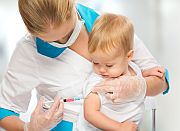Lower rate of seropositivity for children receiving aerosolized versus subcutaneous vaccine
THURSDAY, April 16, 2015 (HealthDay News) — With respect to seropositivity, aerosolized vaccination against measles is inferior to the subcutaneous vaccine, according to a study published in the April 16 issue of the New England Journal of Medicine.
Nicola Low, M.D., from the University of Bern in Switzerland, and colleagues conducted an open-label noninferiority trial involving children aged 9.0 to 11.9 months in India who were eligible for the first dose of measles vaccine. Participants were randomized to receive a single dose of vaccine by means of aerosol inhalation (1,001 children) or subcutaneous injection (1,003 children). Follow-up data were available for 1,560 children in the per-protocol population.
The researchers found that at day 91, 85.4 percent of children in the aerosol group and 94.6 percent in the subcutaneous group were seropositive (difference of −9.2 percentage points). In the full set analysis and after imputation of missing results, the results were similar (85.4 percent in the aerosol group versus 94.7 percent in the subcutaneous injection group; difference of −9.3 percentage points). No serious adverse events were observed as a result of the measles vaccination. Similar adverse-event profiles were seen for the two groups.
“Aerosolized vaccine against measles was immunogenic, but, at the prespecified margin, the aerosolized vaccine was inferior to the subcutaneous vaccine with respect to the rate of seropositivity,” the authors write.
Full Text (subscription or payment may be required)
Copyright © 2015 HealthDay. All rights reserved.








